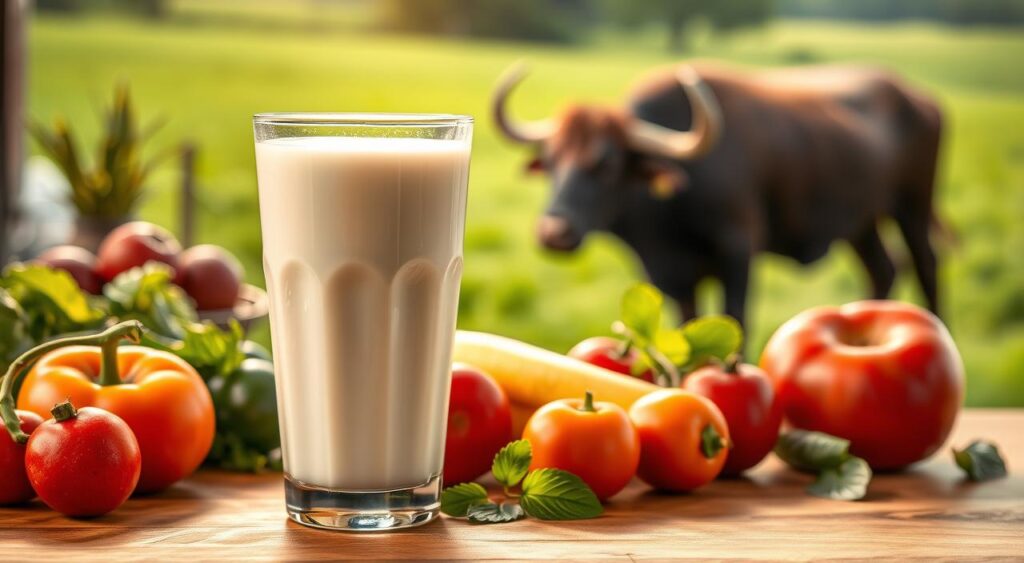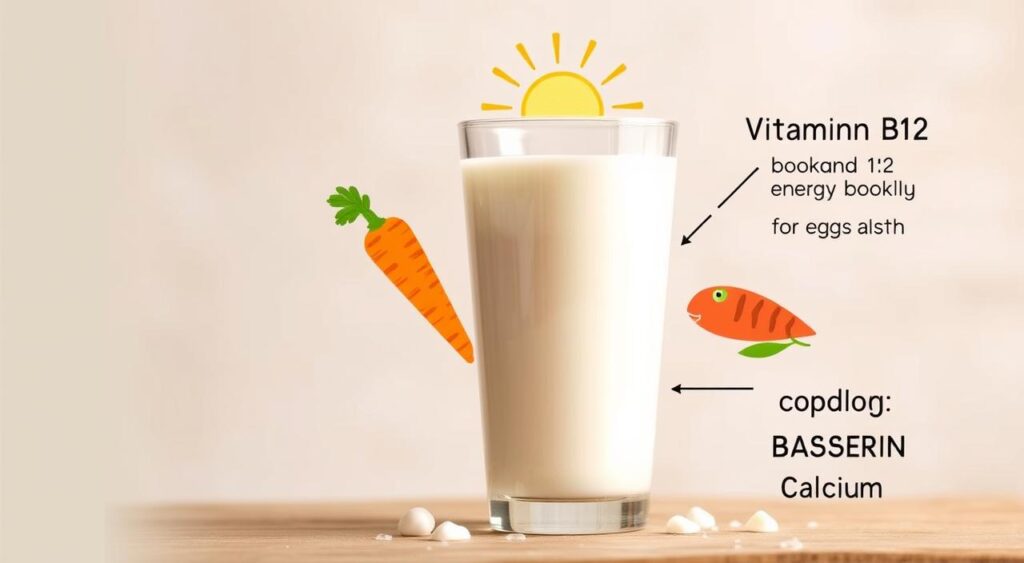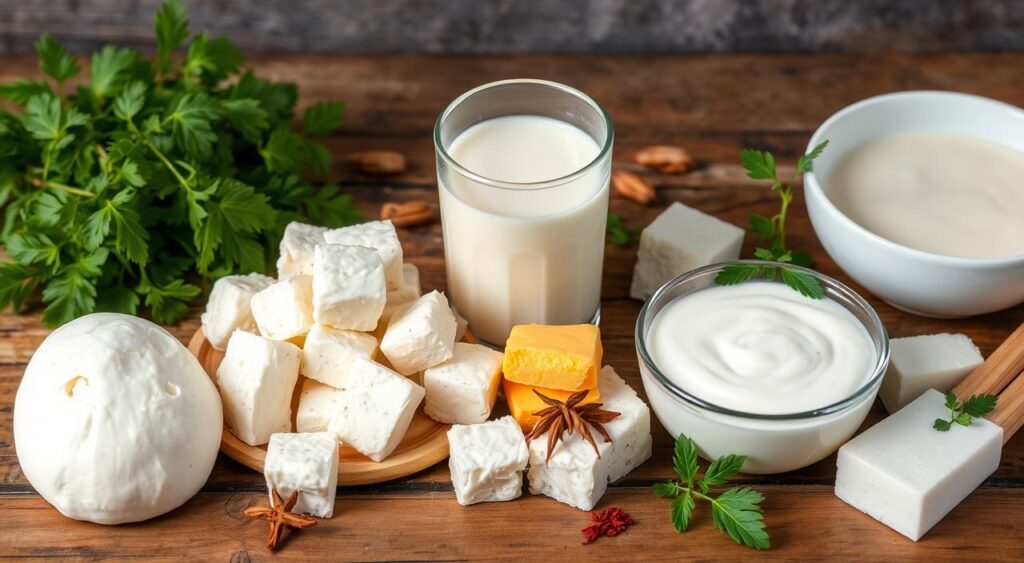1 litre buffalo milk calories
Buffalo milk is known for its creamy texture and is packed with nutrients. It has 237 calories in 1 cup, which is more than cow’s milk. Buffalo milk has 21% carbs, 63% fat, and 15% protein, showing it’s rich in fat and protein.
It’s a great source of protein, with 9.2 grams per liter. That’s 18% of what you need daily. It also has a lot of potassium and calcium, which are good for your bones.
Buffalo milk is more nutritious than cow’s milk, with more vitamins and minerals. Its thick texture is perfect for making butter, ghee, cheese, and ice cream.
Key Points
- 1 liter of buffalo milk contains 237 calories, with a macronutrient profile of 21% carbs, 63% fat, and 15% protein.
- Buffalo milk is an excellent source of protein, providing 9.2 grams per liter (18% of the Daily Value).
- Buffalo milk is high in calcium, with 41% of the Daily Value per 244-gram serving, making it great for bone health.
- Compared to cow’s milk, buffalo milk has a higher nutrient density and is better suited for the production of fatty dairy products.
- The rich, creamy texture of buffalo milk makes it a popular choice for various dairy products.
What is Buffalo Milk?
Buffalo milk comes from water buffaloes and is known for its creamy texture and rich flavor. It’s a favorite in places like India and Pakistan. These countries produce about 80% of the world’s buffalo milk. Its unique taste and nutritional benefits make it popular in many homes and dairy products.
Distinguishing Features of Buffalo Milk

Buffalo milk has more protein, fat, and lactose than cow’s milk. This makes it creamier and more indulgent. Its white color comes from the buffaloes’ ability to turn beta-carotene into vitamin A.
Major Producers of Buffalo Milk
- India
- Pakistan
- China
- Egypt
- Nepal
India and Pakistan lead in buffalo milk production, meeting the world’s demand. While cow’s milk is common in the West, buffalo milk is a hit in local markets. It’s sought after for its richer and more nutritious qualities.
Nutritional Comparison: Buffalo Milk vs. Cow’s Milk
Buffalo milk is packed with more nutrients than cow’s milk. Both are great for essential nutrients, but they have some key differences.
A 1 cup (244 ml) of buffalo milk has 237 calories. Cow’s milk has 149 calories in the same amount. Buffalo milk has more fat and protein, which explains the calorie difference.
| Nutrient | Buffalo Milk (1 cup) | Cow’s Milk (1 cup) |
|---|---|---|
| Calories | 237 | 149 |
| Protein | 9 grams | 8 grams |
| Fat | 17 grams | 8 grams |
| Lactose | 13 grams | 11 grams |
Buffalo milk also has more vitamins and minerals. It has 41% of the Daily Value for phosphorus, 32% for calcium, 19% for magnesium, and 14% for vitamin A. Cow’s milk has 29%, 21%, 6%, and 12% of these Daily Values.
The creamy texture of buffalo milk is great for making ghee and high-fat cheeses. This makes it different from cow’s milk, which is lighter and less creamy. Buffalo milk is versatile in cooking.

Health Benefits of Buffalo Milk
Research shows that buffalo milk offers many health benefits. It has a lot of calcium, which is good for bones and may lower osteoporosis risk. The casein-derived peptides in it also help strengthen bones.
Buffalo milk also has more antioxidants than cow’s milk. This is because it has more good fats. Its vitamins, minerals, and other compounds protect the body from damage.
Potential Bone Health Benefits
Buffalo milk is packed with calcium, which is key for strong bones. It also has a lot of protein, which helps bones stay dense and strong.
Antioxidant Properties
- Buffalo milk has a higher antioxidant capacity than cow’s milk.
- Its monounsaturated fatty acids offer more antioxidant benefits.
- The vitamins, minerals, and bioactive compounds in it also boost its antioxidant power.
Adding buffalo milk to your diet can boost your health. Its special mix of nutrients and health perks make it a great choice for a healthy lifestyle.

1 Litre Buffalo Milk Calories and Macronutrients
Buffalo milk is a rich and nutritious dairy product. It has a unique nutritional profile compared to cow’s milk. The caloric and macronutrient content of 1 litre of buffalo milk is impressive.
1 litre (1000 ml) of buffalo milk has 237 calories. This is much higher than whole cow’s milk, which has about 149 calories per litre.
| Macronutrient | Amount per 1 Litre of Buffalo Milk |
|---|---|
| Fat | 16.81 grams |
| Protein | 9.15 grams |
| Carbohydrates | 13 grams |
The macronutrient breakdown of 1 litre of buffalo milk is as follows: 63% fat, 21% carbohydrates, and 15% protein. This high fat content gives buffalo milk its rich, creamy texture. It’s a favorite in many recipes.
1 litre of buffalo milk also has a lot of saturated fat (11.217 grams), monounsaturated fat (4.360 grams), and a smaller amount of polyunsaturated fat (0.356 grams). It has 46 milligrams of cholesterol per litre.
The calories in 1 litre of buffalo milk and its unique macronutrient composition make it a nutritionally dense dairy option. It offers many health benefits for consumers.

Vitamin and Mineral Content
Buffalo milk is not just high in calories and nutrients. It’s also packed with vitamins and minerals. A 1-cup (244 ml) serving has a lot to offer. It includes 129 mcg of vitamin A, 5.6 mg of vitamin C, and 0.3 mg of iron. It also has 412 mg of calcium and 434 mg of potassium.
Essential Vitamins in Buffalo Milk
Buffalo milk is full of B-complex vitamins like thiamin, riboflavin, and niacin. It also has pantothenic acid, vitamin B6, and vitamin B12. Plus, it’s a good source of folate, vitamins A and C. These vitamins are key for a strong immune system and overall health.
- Vitamin A: 129 mcg (14% DV)
- Vitamin C: 5.6 mg (6% DV)
- Thiamin: 0.1 mg (8% DV)
- Riboflavin: 0.4 mg (31% DV)
- Niacin: 0.1 mg (1% DV)
- Pantothenic Acid: 0.6 mg (6% DV)
- Vitamin B6: 0.1 mg (6% DV)
- Folate: 11 mcg (3% DV)
- Vitamin B12: 0.4 mcg (17% DV)
The vitamins and minerals in buffalo milk make it a great choice for a healthy diet. Adding it to your meals can help you get the vitamins and minerals your body needs. This supports your health and well-being.

Potential Downsides and Allergies
Buffalo milk is very nutritious, but it has some downsides. People allergic to cow’s milk might also react to buffalo milk. This is because the proteins in both milks are similar. But, more research is needed to understand this connection fully.
Buffalo milk also has more fat and calories than other milks. A cup of buffalo milk has 237 calories and 16.8 grams of fat. This might not be good for those trying to eat less fat and calories. Too much buffalo milk could lead to weight gain or even diabetes.
| Milk Type | Fat Content (g per cup) |
|---|---|
| Whole Milk | 8 |
| 2% Milk | 5 |
| 1% Milk | 2 |
| Skim Milk | 0.2 |
| Buffalo Milk | 16.8 |
It’s key to know the downsides of buffalo milk and buffalo milk allergies before adding it to your diet. Talking to a healthcare professional can help decide if buffalo milk is right for you.

Choosing Buffalo Milk Products
Buffalo milk offers a wide range of options for your diet. Its rich, creamy texture is perfect for many dairy items. You can enjoy everything from buffalo milk butter to buffalo milk ice cream.
Popular Buffalo Milk-Based Dairy Products
Here are some common buffalo milk dairy items:
- Buffalo Milk Ricotta – Buffalo milk’s high fat content makes this cheese incredibly creamy.
- Buffalo Milk Truffle Mezzalune – These pasta pockets are filled with buffalo milk ricotta and truffles, a heavenly mix.
- Buffalo Milk Butter – With more fat, this butter is richer and more flavorful, great for cooking and spreading.
- Buffalo Milk-Based Smoothies and Desserts – Its natural sweetness and creaminess make it perfect for smoothies and ice creams.
Adding buffalo milk products to your diet is a smart choice. They offer unique nutritional benefits and a delicious taste.

Conclusion
Buffalo milk is a nutritious dairy product with many benefits. It has more calories, protein, fat, and minerals than cow’s milk. This makes it a great choice for those looking for a more nutritious option.
Its creamy texture is perfect for making butter, ghee, cheese, and ice cream. Buffalo milk might also help with bone health and offer antioxidant benefits. But, more research is needed to confirm these effects.
People allergic to cow’s milk might also react to buffalo milk. But, the evidence is not yet clear. Overall, buffalo milk nutrition shows it’s a valuable part of a balanced diet.
Buffalo milk is popular worldwide, with India, China, and Pakistan leading in production. As dairy demand grows, buffalo milk will be key in meeting nutritional needs, mainly in areas where it’s commonly consumed.




